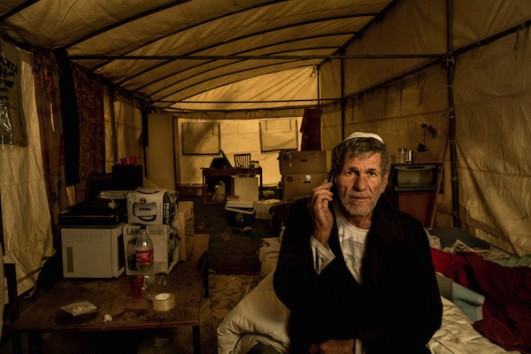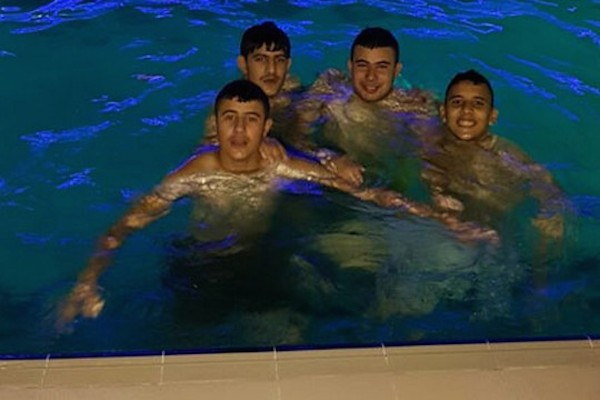Netanyahu’s recent media blitz has left a group of wistful admirers among the journalists he met – the very same journalists who betrayed their constituents, the millions of poor, sick and powerless people Netanyahu doesn’t give a damn about.
By Yael Marom

Prime Minister Benjamin Netanyahu’s still unexplained media blitz, in which he spent dozens of hours in off-the-record meetings with leading Israeli journalists, turned some of his most ferocious critics into wistful admirers. One journalist after another wrote lengthy columns and Facebook posts, in which they offered their insight into the complex personality of the man they had rarely, if ever, met before.
The fortune that befell these journalists offers an opportunity to recall those who will be spared the dear leader’s charm offensive.
Netanyahu will not meet more than one million Israelis living under the poverty line – as a general rule, he tends to shun minimum wage earners. Neither will he spend time with homeless families, some of whom spent a good part of the last few decades on the waiting list for public housing, including the Givat Amal tenement dwellers who were evicted to make way for real estate mogul Yitzhak Tshuva’s latest ritzy project, or residents of unrecognized Bedouin villages who are still waiting to be connected to water, electricity, sewage and transportation grids.
He won’t meet with patients who have been waiting for months and years for life-saving treatments. He won’t witness the distress of those who fell victim to the deterioration of a once illustrious public health system that now can only meet the needs of rich medical tourists. He won’t meet pensioners who have to choose between food and medicines, or those who desperately yearn for a medical cannabis prescription.

Netanyahu will not be pressured by the media to meet again the family of Avraham Mangisto, who has been in captivity in Gaza for two years. At most, he will dispatch one of his meddling envoys in an attempt to buy more time. All people are equal, except Ethiopian-Israelis who are less equal. He won’t meet the family of Yosef Salamsa, who was a victim of fatal police brutality. Neither will he meet young Ethiopian-Israelis who are, time and again, humiliated by police.
King Bibi won’t visit the family of Amana Yassin, who was murdered by her husband while nine months pregnant, or any other victim of domestic terror.
Nor will he visit the family of 15-year-old Mahmoud Badran, who was shot dead by a soldier for no apparent reason, the family of a brother and sister who were killed by soldiers at Qalandiya checkpoint a few months ago, and the family of Iyad Zakaria, whose killer now stands trial for manslaughter. As a general rule, he doesn’t meet with Arabs, especially those who live in the occupied territories and most certainly not relatives of those murdered by Israel. Because there’s no such thing as the occupation, the Palestinians are a fabrication, and in any event they are better off here than in Syria.

He won’t meet Israelis living next door to the Gaza Strip – either alive, when they call for a diplomatic solution to their plight, or when they die of rocket fire. He won’t meet them during the wars he cooks up for them or during periods of calm, when they demand answers.
It’s just that our beloved prime minister simply doesn’t meet ordinary people. He doesn’t own a credit card and doesn’t have to pay for coffee or ice cream. He never meets shopkeepers, mechanics, taxi and bus drivers, bank tellers (as opposed to their greedy bosses) and cleaners. And the list goes on and on.
Needless to say, he won’t meet left-wing bloggers (unlike right-wing ones). But that’s OK – I don’t want to meet him either. We are here to bite him in the ass and constantly raise important issues on behalf of our readers, not to chuckle at the scripted jokes that he rehearses with his staff.
All those journalists who stood at attention when Netanyahu called them in for a briefing must have forgotten that their job is to speak for the people Netanyahu will never meet; that they will not be held accountable to Netanyahu, but to their readers, viewers and listeners. These people are old and poor, victims of domestic violence, struggling workers, and the bereaving Mangisto, Salamsa and Badran families.
If Netanyahu ever accounted for his policies – by giving interviews, speaking to the public, answering tough questions – this kind of background briefings would be acceptable. But he doesn’t. And as long as this is the case, journalists should decline to participate in this charade, on behalf of those Netanyahu will never meet.
Yael Marom is Just Vision’s public engagement manager in Israel and a co-editor of Local Call, where this article was originally published in Hebrew.
